‘It’s going to save lives.’ New veteran nonprofit launches in Lewis County
Published 4:40 pm Wednesday, July 26, 2023
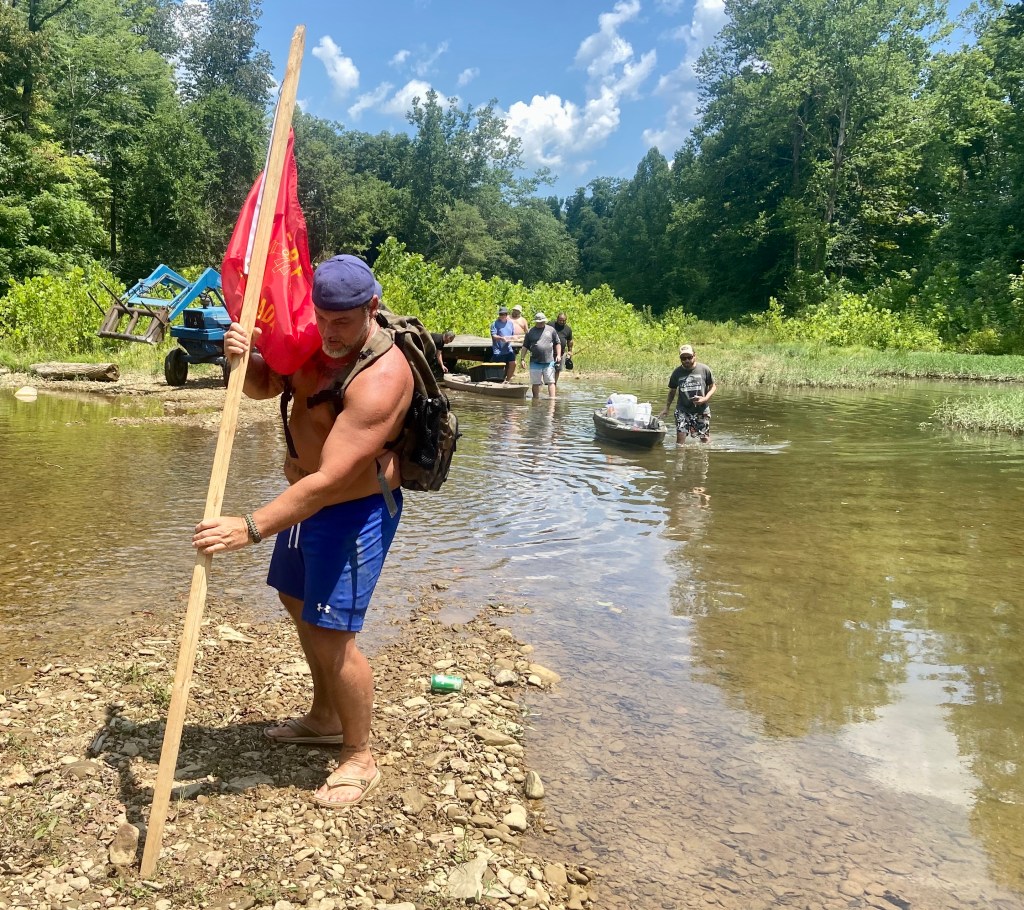
- Mark Hatfield finds a place to display his unit’s guidon while they hang out at a creek in Vanceburg, Kentucky. Hatfield is the first veteran nominated for Warrior Ridge, a new nonprofit based Lewis County designed to reduce the veteran suicide rate by rebuilding support systems.
VANCEBURG – Dozens of children’s drawings, slightly marred by recent rain, line the steep gravel hill leading to Warrior Ridge.
Most depict American flags, eagles and soldiers, and thank the combat veterans heading to Warrior Ridge for their service.
At the top of the hill sits an unassuming campground. To the left is a cabin, filled to the brim with donated meals, snacks and desserts.
To the right are barracks where the veterans sleep. In the back is a bonfire, circled by lawn chairs, where they gather each night to roast marshmallows and trade stories.
And at the center of it all is an American flag, hoisted on a pole at least 100 feet high. It is raised each day at official sunrise and lowered at official sunset, said Landon Bentley, founder of Warrior Ridge, a new nonprofit whose goal is to reduce the suicide rate among veterans.
About 17 veterans died by suicide every day in 2020, according to a U.S. Department of Veterans Affairs annual report. That’s over 31 deaths per 100,000 U.S. Veterans each year, compared to the nationwide suicide rate of 14 deaths per 100,000 Americans.
Many veterans dispute that figure, and believe the suicide rate is much higher, Bentley said.
Bentley, a veteran who was part of Operation Iraqi Freedom from 2005-07, believes he can make a dent in that.

Eleven combat veterans from the U.S. Army’s 101st Airborne Division reunite at Warrior Ridge, a new nonprofit based Lewis County designed to reduce the veteran suicide rate by rebuilding support systems.
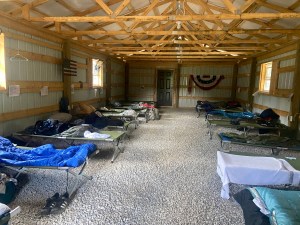
Veteran groups share barracks during their stay at Warrior Ridge, a new nonprofit based Lewis County designed to reduce the veteran suicide rate by rebuilding support systems.
From Bonfires with Bentley to Warrior Ridge
When Bentley returned home after his years of military service, he was miserable.
“I was in a bad spot, and my family wasn’t there supporting,” he said. “They were calling me lazy and don’t want to work and this and that. I was in a position where I had no money, my cars got (repossessed), everything.”
Bentley was at rock bottom. It was only then that he turned to Ryan Roe, his best friend since kindergarten. Roe came up with his truck and a U-Haul trailer, loaded up all of Bentley’s stuff and moved him down to Lewis County.
After settling in, Bentley was met with support from his Army buddies who heard about what he was going through. He started having bonfires for his veteran friends, inviting them to bring their former squad members along as well.
Reconnecting veterans with their “brothers,” as they call each other, helped them build a support system many lacked in their daily lives, Bentley said.
But they kept running into a problem – many veterans couldn’t afford to miss work and make the trek to Lewis County.
So several months ago, a leadership team of Bentley, Roe, Greg Hershey and Morgan Roe launched Warrior Ridge, a nonprofit designed to reunite combat veterans with their former teams to offer mental, emotional and physical relief from their daily stressors and lingering trauma.
“These guys, they feel so alone,” Bentley said. “And it’s not like anybody’s doing anything wrong to them. It’s that they’re around people that have no idea what they experienced. And it’s so extreme. … It’s hard to keep going. There’s a lot of mental health issues going on with soldiers, and none of them will admit it hardly.”
It’s a simple but effective idea, Bentley said. Bring squads back together so they can be around the only people who truly understand what they’ve been though, and let them relax, let their walls down. Let them talk openly, without shame. Let them be kids again for a few days.
“It’s been very therapeutic,” said Zacchaeus Whitfield, a member of the first group of veterans to visit Warrior Ridge.
“… When I go home, I have another gust of air to deal with life better.”
After being open a month, they’ve raised about $40,000. But they haven’t paid a single cent for labor and have an abundance of food and supplies thanks to the generosity of the community.
Several times a day, people drive up the gravel road in their pickup trucks, looking to drop things off. Wives of veterans tell Bentley that they wish their husbands had something like this after their service. On Sunday, Bentley gathered the first group of veterans around him to share that a local church had announced all of its proceeds for an upcoming event will go directly to Warrior Ridge.
“Man, I bet you there’s not a community in the nation that’s as involved with something as this,” he said.
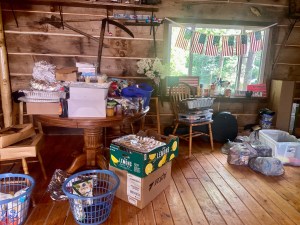
Community-donated food and supplies fill the cabin at Warrior Ridge, a new nonprofit based Lewis County designed to reduce the veteran suicide rate by rebuilding support systems.
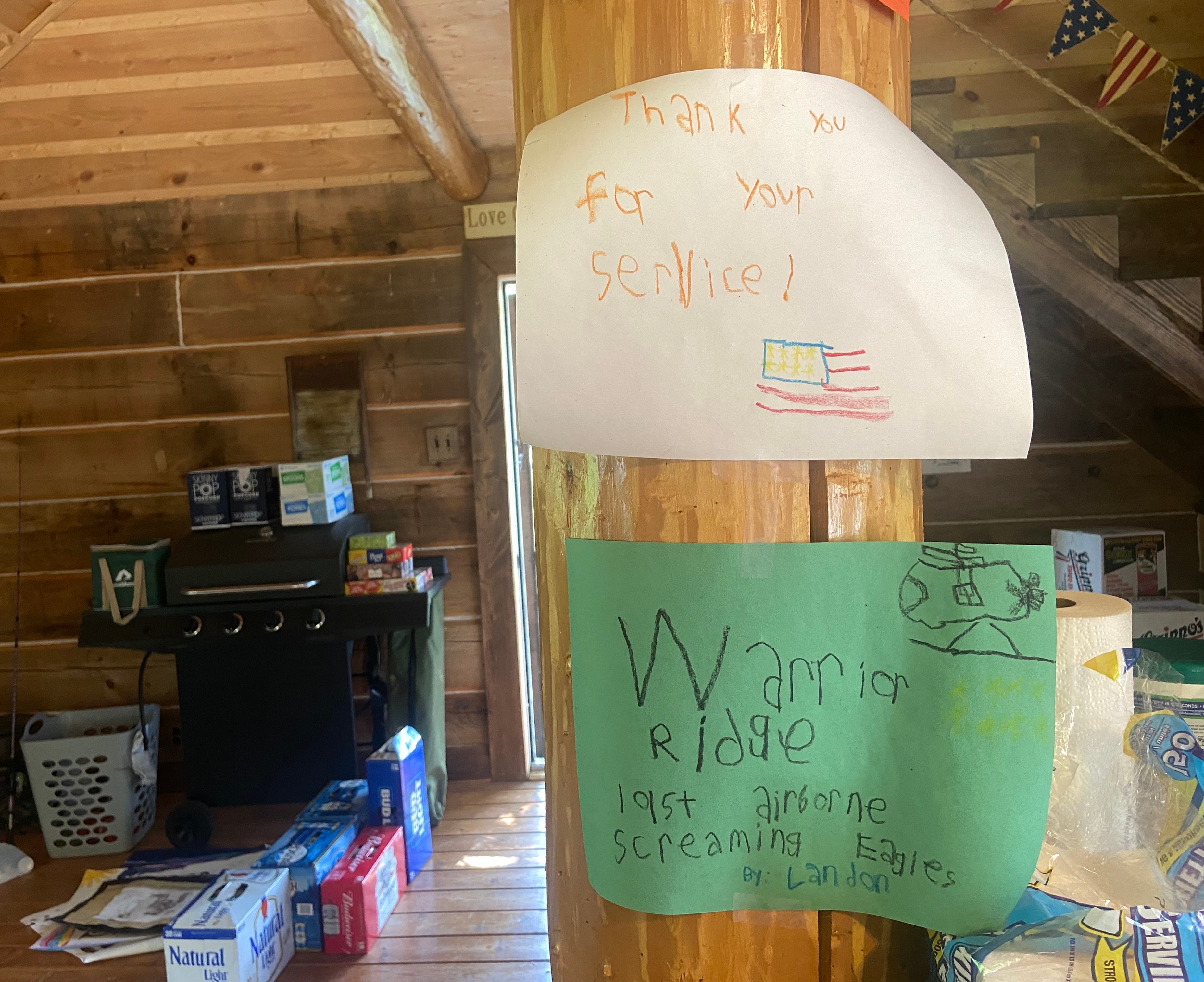
Children’s drawings are displayed inside a cabin at Warrior Ridge, a new nonprofit based Lewis County designed to reduce the veteran suicide rate by rebuilding support systems.
‘It’s like a birthday party’
Mark Hatfield commemorated the 20th anniversary of his participation in the Uday Qusay elimination, an Iraq war mission that killed Saddam Hussein’s two sons, with 10 of his brothers at Warrior Ridge.
Uday and Qusay Hussein were the military’s number two and three targets, after the deposed Iraqi president himself. Hatfield was part of the operation’s Quick Reaction Force for the U.S. Army’s 101st Airborne Division.
Hatfield and his squad were part of history, but it has come at a cost. They lost three fellow soldiers during the war and several more since they’ve returned.
“I think it’s opened a lot of our eyes that time flies and that we were supposed to get each other home from Iraq in ‘03 to ‘04, but I think a lot of us also know that we have to help each other in life, too, because our war doesn’t just end like we thought,” Hatfield said.
Warrior Ridge works through veteran nominations. Bentley invites one veteran struggling with mental health and lets them choose members of their combat squad to join them for a long weekend in Lewis County. Each year, the group will return, rebuilding stronger and stronger bonds.
“It’s like a birthday party,” Bentley said.
Hatfield was the first pick. He and Bentley worked in recruitment together, so they know each other’s struggles well.
When Hatfield got home from Iraq, he quickly realized the civilian world wasn’t meant for him. So he went back into the military. He became known as someone who would get out every three years or so, only to return soon after, he said.
Hatfield always dealt with lingering trauma from his service, but he didn’t seek help for it. After 18.5 years, his mental health struggles reached a low he could no longer ignore.
“I was able to compartmentalize for a while, but I feel like people run out of being able to do that after a certain amount of time,” Hatfield said. “And it took effect on me.”
The military sent Hatfield to Texas for seven weeks at an all-military/PTSD unit. There, he said he faced his traumas head-on and learned how and why they were affecting him. After his stay, Hatfield medically retired from the military.
Although he initially had anxiety about Warrior Ridge, reuniting with his brothers has been “unreal,” he said. From the moment they arrived, he said all anyone has wanted to do is talk. They have 20 years of life experiences to catch up on.
“I just thought that instantly I’d have to remember things I didn’t want to remember,” he said.
“We haven’t sat around and talked about anything that we don’t want to talk about. We sat around and talked about before we went to Iraq or right when we went back. It doesn’t mean we’re hiding anything because we’re there for each other. We already know we’re an open book if we want to talk about anything.”
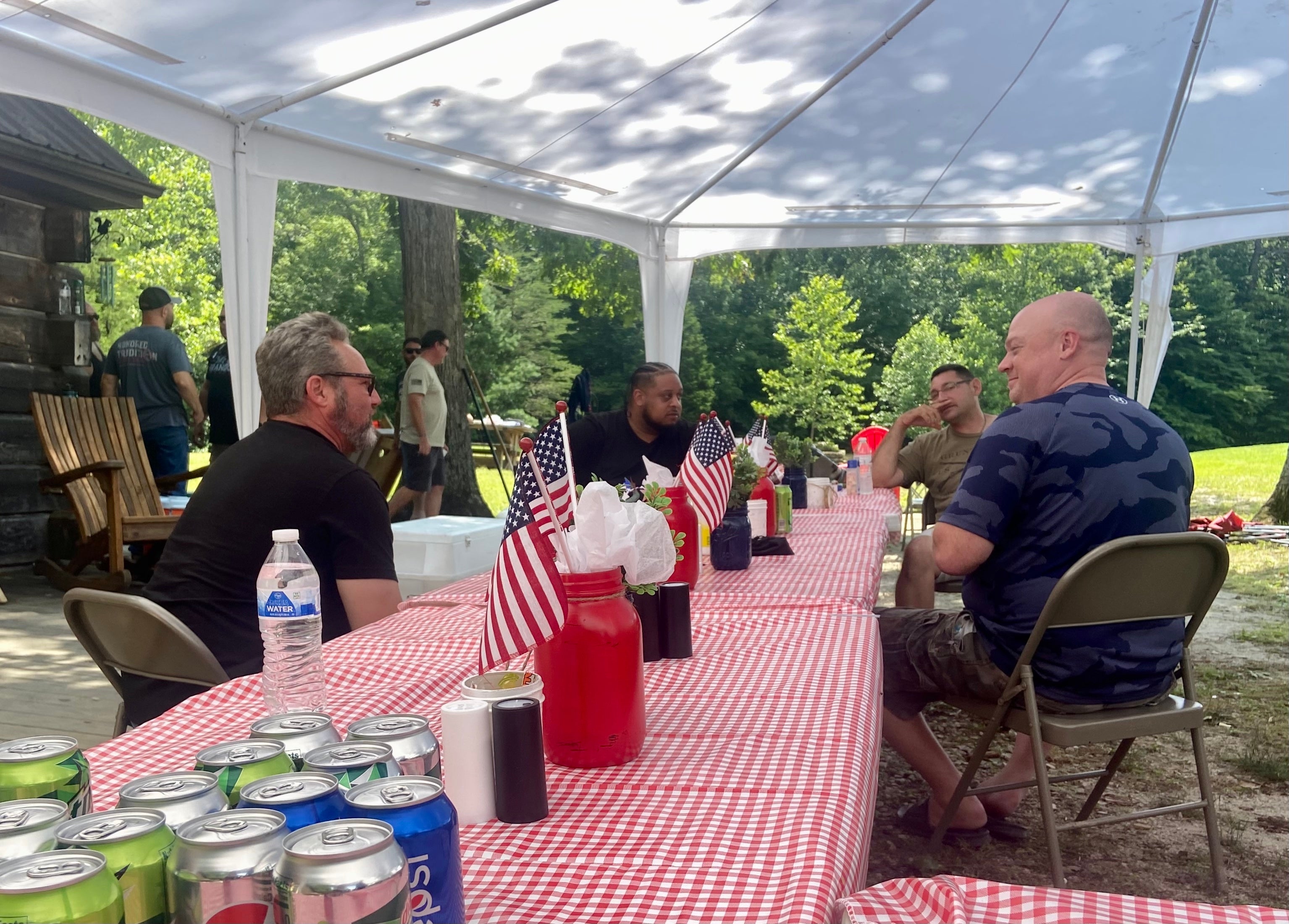
Eleven combat veterans from the U.S. Army’s 101st Airborne Division reunite at Warrior Ridge, a new nonprofit based Lewis County designed to reduce the veteran suicide rate by rebuilding support systems.
‘Sometimes it gets the best of us’
The first thing soldiers learn at boot camp is that they’re not allowed to be anything but tough, Bentley said.
Complaints and weakness are met with yelling, insults and punishment by training leaders. Soldiers can’t be hurt or sick – they just have to suck it up.
“You learn right then and there – no more,” Bentley said. “Like, I’m alright, I’m a man. You don’t complain about being hurt or my back hurts or I’m tired or anything like that. You push. So I think they actually train you to be like that.”
Mental health is already a difficult topic for many to broach. But this training often makes it even harder for veterans, Bentley said. So, often, when soldiers return from war, they don’t share their struggles.
Much of veterans’ reluctance to talk about their mental health struggles is about pride and ego, Whitfield said.
“Sometimes it gets the best of us,’ he said.
But at Warrior Ridge, Whitfield doesn’t feel the same shame and embarrassment he said he might feel sharing with an average person. His brothers know what he’s going through, because they’ve been through it too – family issues, relationship problems, financial struggles.
Bentley says that creating a judgment-free environment is key. Although the veterans might be connected on social media, it’s not a real connection. Nobody is going to post on Facebook that they are down to $62 left to live on for two weeks, Bentley said.
Warrior Ridge is a place they can relax, and hopefully, deprogram harmful mentalities around mental health outside of a sometimes-uncomfortable therapist’s office.
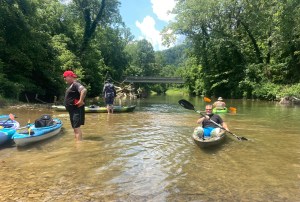
Eleven combat veterans from the U.S. Army’s 101st Airborne Division reunite at Warrior Ridge, a new nonprofit based Lewis County designed to reduce the veteran suicide rate by rebuilding support systems. Sunday afternoon, they gather at a creek in Vanceburg, Kentucky.
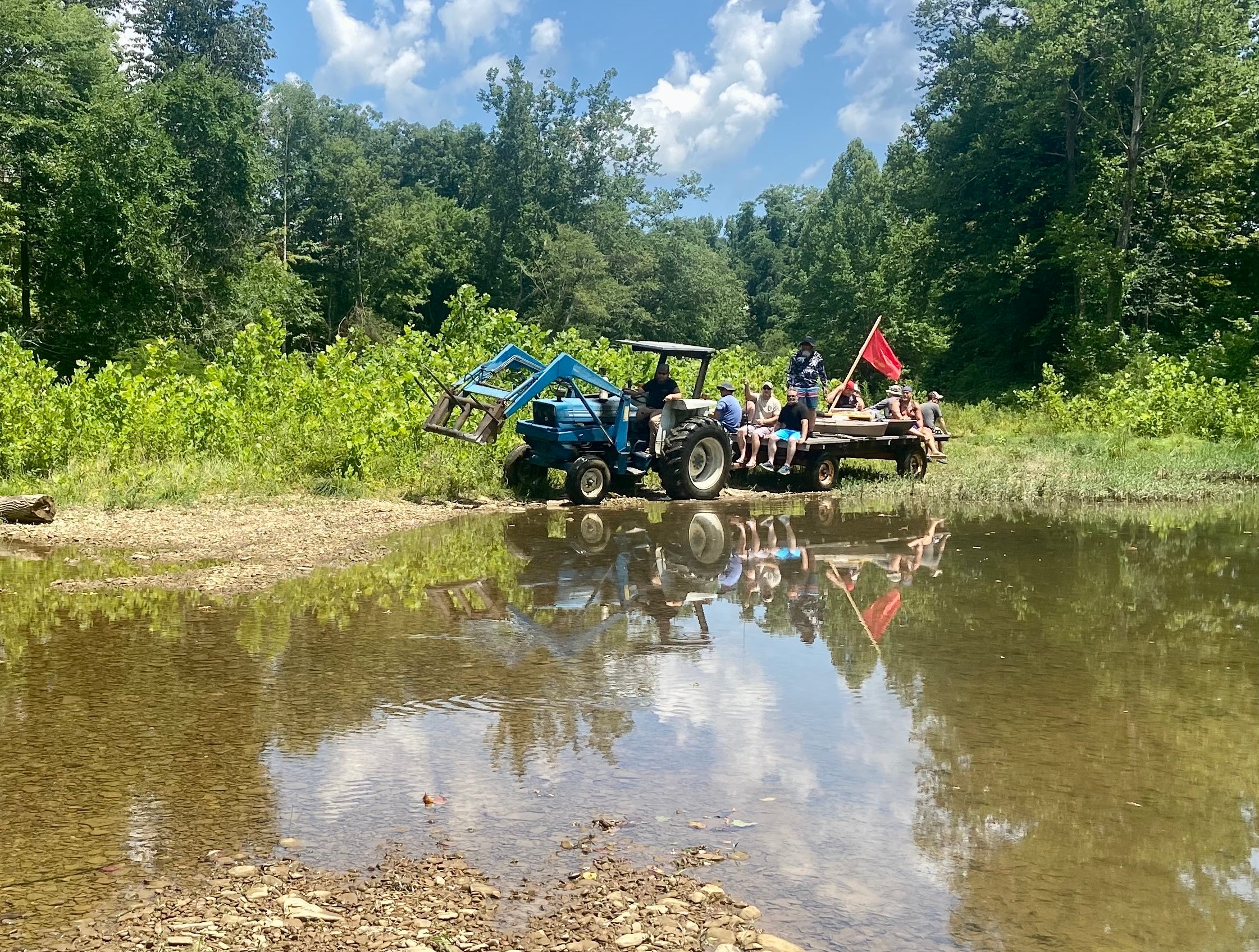
Eleven combat veterans from the U.S. Army’s 101st Airborne Division reunite at Warrior Ridge, a new nonprofit based Lewis County designed to reduce the veteran suicide rate by rebuilding support systems. Sunday afternoon, they gather at a creek in Vanceburg, Kentucky.
The future
Bentley knows there is still work to be done. But he is determined that one day, Warrior Ridge will be flawless. Next year, he hopes to reunite 40 groups, about three a month.
“I promise if we can get big enough, you’ll see that suicide rate go down, and I truly believe that,” he said.
There are over 45,000 nonprofits serving veterans in the U.S. Many have millions of dollars, but they use it to build $2 million lodges, Bentley said. He thinks that Warrior Ridge can do better by building things less expensively and focusing more on the people.
“Man, give me $2 million and watch what we can do,” he said.
On Sunday afternoon, the veteran group headed to the creek. They temporarily abandoned their corn hole games and fishing rods to lather on sunscreen before piling on to the wagon of Roe’s bright blue tractor for the trip.
Hatfield grabbed their red guidon, a highly respected military flag symbolizing their unit and branch designation. It goes everywhere with them.
Once at the creek, the group paddled out to a nearby bridge in kayaks. They took turns daring each other to jump off, interspersed with stories about dodging IEDs and more recent life experiences.
Their time at Warrior Ridge was short, but Hatfield said it allowed them all to “put missing puzzle pieces back together again.” He has high hopes for the nonprofit’s future.
“I think it’s going to save lives,” he said. “I think it already has.”





